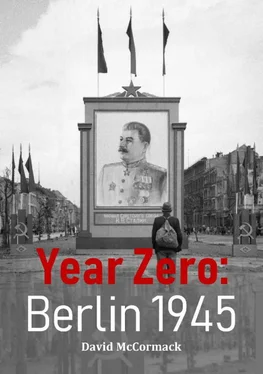Finally, at 03.50hrs, General Krebs arrived, accompanied by a Latvian SS officer named Neilands. Krebs had no need of an interpreter as he spoke good Russian. However, he chose to take Neilands with him in order to give himself extra thinking time during the negotiations. Krebs began the talks without any preamble (nor formal introductions). The first phase of the talks proceeded as follows:
Krebs: I shall speak of exceptionally secret matters. You are the first foreigner to whom I give the information that on 30 April Hitler passed from us of his own will, ending his life.
Chuikov: We know that.
Krebs: According to the Fuhrer’s testament… (reads from document). The aim of this declaration – to find the most favourable way out for those peoples who have borne the greatest loses in the war. The document may be passed to your command.
Chuikov: Is this document concerned with Berlin or with the whole of Germany?
Krebs: I am empowered to speak on behalf of the entire German Army. I am Goebbels’ plenipotentiary.
Chuikov: I shall report to Marshal Zhukov.
Krebs: My first question: there will be no firing during the talks?
Chuikov: You are introducing yourself in two capacities as: a military representative of an army which has been defeated; and a representative of a government which is seeking talks with my government. I am a military man and I see no other way out for your army but for it to lay down its arms forthwith, to surrender, in order that blood shall not be shed in vain. In the given situation Goebbels and Bormann are not strengthening your army or its fighting capacity. Therefore would it not be better for you and Goebbels to give orders to your troops to cease all resistance?
Krebs: There are other possibilities for ending the war. For it is essential to make possible a meeting of the new government, headed by Doenitz, which will decide this question by means of talks with the Soviet government.
Chuikov: What government can there be if your Fuhrer has ended his life and thus admitted the invalidity of the regime he headed? It may be that he leaves behind him one of his deputies, who has the right to decide whether or not there shall be further bloodshed. Who is now in Hitler’s place?
Krebs: Now Goebbels is in Hitler’s place. He has been appointed Chancellor. But before his death, Hitler created a new government, headed by Grand-Admiral Doenitz.
At this point, Chuikov contacted Marshal Zhukov with news of these developments. Zhukov in turn contacted Stalin, rousing him from the much needed sleep he required before the May Day parade. Always a man of few words, Stalin responded to the news of Hitler’s death by saying, ‘So – that’s the end of the bastard. Too bad that we did not manage to take him alive’. With regard to the negotiations, Stalin insisted on unconditional surrender.
Having been informed by Zhukov that there was no room for negotiation, Chuikov went about his task of forcing Krebs to accept that there was no alternative other than a complete surrender. Krebs, desperately trying to buy time, continued to sidestep the issue of a surrender which he knew would in effect draw a final line under any lingering hopes of a continuation of the regime. The discussions dragged on, developing into a circular argument in which Krebs continued to make a case for the recognition of the Doenitz government. As the following exchange demonstrates, Chuikov was wise to his scheming and was having none of it:
Krebs: For the purpose of enabling us to discuss your demands, I ask that there be a temporary cessation of hostilities, and for help in arranging a meeting of our new government here, in Berlin. Particularly in Berlin, not in any other place.
Chuikov: We can understand what your new government wants. All the more easily since we know about the attempts made by your friends Himmler and Goering to find out the lie of the land with our allies. You surely cannot be unaware of this.
Krebs: I am an envoy with powers from the new government which was formed in accordance with Hitler’s will. A new government may appear in the south, but it will be illegal. So far there is only a government in Berlin, it is the legal one, and we are asking for an armistice so that all members of the government can meet together, discuss the situation and conclude a peace advantageous to you and to us.
Chuikov: The question of an armistice or of peace can be settled only on the basis of a general surrender. That is our decision and the decision of our allies and no talks nor promises will enable you to break this united front of the anti-Hitlerite coalition.
Krebs: We think that the U.S.S.R. will take account of the new legal government. This is advantageous and convenient to both parties. If you gain control of the area in which the government is, and destroy us all, then the Germans will have no chance to work with you and….
Chuikov: We came not to destroy Germans, but to liberate them from Fascism. And Germans, honourable Germans, are already working with us to avoid further bloodshed.
Krebs: We ask you to recognise the new government of Germany up to the time of a complete surrender, to establish contact with it and to give it the opportunity to enter into relations with your government. It is only you who will gain by this.
Exasperated and exhausted by the interminable wrangling, Chuikov once again conferred with Zhukov by telephone. Zhukov gave instructions to keep the talks going and in the meantime try to discern the real reason behind Krebs’ proposals. After nearly an hour of fruitless discussions, Chuikov sat down for round two. Krebs was the first to speak:
Krebs: I am not able to carry on any other talks. I am only an envoy and cannot answer for my government. It is in your interest to hold talks with the new government of Germany… It is you who are strong – we know that, and it is what you think yourselves.
Chuikov: You must understand General, that we know what you want of us. You are intending to warn me that you will carry on the struggle, or to be more precise, your senseless resistance, which will increase the number of victims… What is the point of your struggle?
Krebs: We will fight on to the last.
Chuikov: General, what have you left? With what forces do you mean to fight? I am waiting for complete surrender.
Krebs: No! In the event of a complete surrender we shall not exist as a government.
It was now 05.00hrs. It was clear to Chuikov that Krebs had no authority to authorise a complete surrender and that his sole task as an envoy was to seek legitimacy for the new government. Chuikov pressed on his demands for surrender by injecting a dose of reality into the discussions:
Chuikov: You are insisting on an armistice, you are proposing to engage in peace talks, and this at a time when your troops are surrendering of their own accord, giving themselves up.
Krebs: Where?
Chuikov: Everywhere.
Krebs: Without orders?
Chuikov: Our men are advancing, yours are surrendering.
Krebs: Perhaps in some isolated cases?
After reading out loud a Soviet news report on Himmler’s attempt at starting negotiations with Britain and America, Chuikov pressed home his point that Hitler’s regime was finished and as such any new government formed in the wake of his political testament was invalidated:
Chuikov: Your so-called new government will not agree to a general surrender because it has bound itself in advance by Hitler’s will, and intends to carry on the war. Your new government, or new cabinet as Hitler calls it in his political testament, wants to carry out his will in the future…
For Chuikov, the hands on the clock appeared to be moving even more slowly. He could do nothing but wait for a final decision from Moscow regarding the formal surrender terms.
Читать дальше












